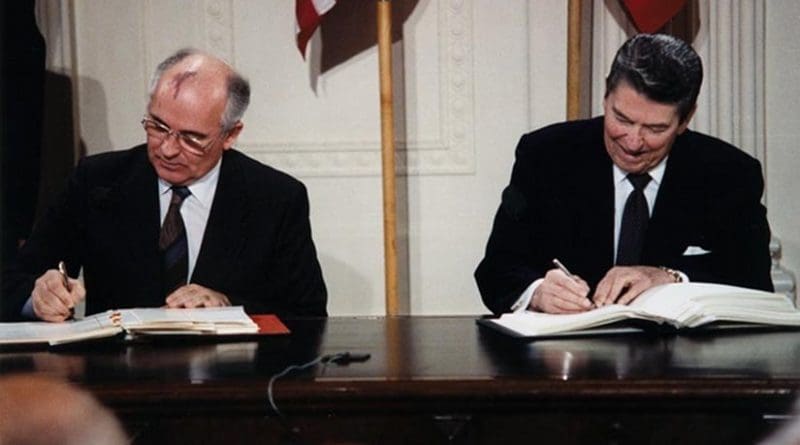What Cold War Consensus? – OpEd
By Mike Watson*
When the NATO leaders summit begins this week in London, brows will be knitted and concerns will be shared about the transatlantic relationship’s health. Since French President Emmanuel Macron proclaimed the brain death of NATO, the alliance’s troubles have been thrust back into the headlines, and observers are lamenting the lost Cold War consensus that guided the United States and Western Europe through the half-century confrontation with the Soviet Union. A question: What consensus are they talking about?
The Cold War consensus myth has several forms, but the most prominent is that the looming threat of the Soviet Union forced Americans to unify politically, putting aside their differences and working together to achieve great feats at home and abroad. For example, the perceived need to attract the Third World supposedly eased the passage of civil rights legislation.
However, the historical record does not support this myth. From the start of the Cold War, the struggle against Communism created more division at home than unity. During the Truman administration, Mao’s conquest of China sparked fierce recriminations and catapulted Joe McCarthy to fame just as the Alger Hiss trial shredded the foreign policy establishment’s credibility in the eyes of the American people. This is before President Eisenhower had to send paratroopers to restore order in Little Rock, and before the John Birch Society formed to expose supposed closet Communists like Ike.
The situation did not improve in the Sixties or Seventies. In the 1964 election, people who considered themselves sober and serious observers of politics thought that they saw in Barry Goldwater and his fans–like Hillary Clinton–the rise of American fascism. The Kennedy administration spied on journalists, business executives and domestic opponents, and Presidents Johnson and Nixon did not expand these activities because they felt a strong political consensus backing them. Watergate was not a time of national healing and cohesion either.
And that was only the half of it. The Vietnam War did not contribute toward domestic tranquility, and the surge of draft and race riots do not suggest that the country was firmly united on much of anything during that period. Even before the war, a Communist murdered President Kennedy and initiated a wave of assassinations that claimed Martin Luther King, Robert Kennedy, and others. From 1970 to 1979, domestic terrorists killed people, hijacked aircraft, and detonated bombs across the country during the “Golden Age of terrorism in the United States.”
Surely things got better in the Eighties: morning in America, anyone? It is true that the killings generally stopped during the Reagan administration, but it was hardly a time of American unity. Nearly one million people rallied in Central Park to oppose Pershing II missile deployments in Europe and subsequent rallies filled 140 American cities. Liberals accused Reagan of trying to replace the Bill of Rights with Mein Kampf, and that was not even the comment that he dubbed “the most vicious pack of lies I’ve ever seen.”
Suffice it to say, the Cold War was not a time of much domestic consensus in the United States. How about a transatlantic one?
Another variant of this myth is that the Americans and West Europeans drew together tightly in the face of the Soviet threat. They certainly did work together on many issues where their vital interests were at stake, but there was plenty of division too. The looming Soviet menace did not prevent the Eisenhower administration from threatening to destroy the pound sterling during the Suez Crisis, or Charles de Gaulle from quitting NATO’s integrated command, or Senate Majority Leader Mike Mansfield from trying to slash US commitments to Europe because NATO allies weren’t paying their fair share, or Turkey from invading Cyprus, or the Italian governing coalitions from flirting with the Communists, or Europeans from launching massive protests against the Pershings.
In fact, many of the dynamics that bedevil policymakers today were present during the Cold War: Zbigniew Brzezinski remarks in his memoirs that during the Carter administration, the transatlantic relationship frayed when the Cold War spread to the Middle East and South Africa, drawing American attention away from Europe, and the unpopular war in Vietnam and the Nixon presidency hurt American standing in Europe.
That is not to make light of today’s challenges or to suggest that their solutions are any more foreordained than the Cold War’s were. But coating the past in a nostalgic haze can make the present’s trials seem harder than they are and can threaten our future: imagining that previous challenges were less difficult than they were can make today’s feel more daunting and lead to demoralization. A closer look reveals that NATO has had a series of severe ruptures before, and from its inception leaders needed to compromise and cajole and rub shoulders–and occasionally make threats–and it is dangerous to erase this history.
The Cold War consensus is not dead. It is imaginary.
*About the author: Mike Watson,Associate Director, Center for the Future of Liberal Society
Source: This article was published by the Hudson Institute

